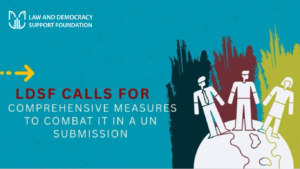
Egypt Continues to Escalate Its Transnational Repression
Law and Democracy Support Foundation (LDSF) strongly condemns the arrest of El Sayed Sobhi Eid (63), father of exiled Researcher and podcast host Seif al-Islam Eid, by Egyptian security forces on Wednesday, 22 October 2025, following a raid on the family’s home in Alexandria, which was subsequently followed by a raid on the home of his 82-year-old maternal grandfather. These acts constitute a serious violation of the inviolability of homes as guaranteed under Article 58 of the Egyptian Constitution, which prohibits entry or search of private residences without a judicial warrant based on reasonable cause.
Since his arrest, El Sayed Sobhi Eid has been subjected to enforced disappearance. The authorities have not disclosed his place of detention or provided any legal justification for his arrest, in clear contravention of Articles 54 and 55 of the Egyptian Constitution, as well as Article 9 of the International Covenant on Civil and Political Rights (ICCPR), which guarantees every individual the right to liberty and personal security. Technical indicators show that his phone remains connected to the internet, with incoming messages on WhatsApp being marked as read—raising serious concerns regarding his safety and the likelihood that he may be under duress or coercive treatment.
The Eid family has faced a pattern of repeated security harassment in recent years: first, in November 2022, when their homes in Alexandria and Kafr al-Dawwar were raided and Seif al-Islam’s elderly mother was terrorized; and again on 30 April 2025, when Mr. Sobhi Eid was detained for 18 days and interrogated about his son’s activities abroad. The latest arrest confirms once again the systematic pattern of transnational repression, in which the Egyptian authorities retaliate against critics living in exile through collective punishment of their relatives in Egypt.
Seif al-Islam himself has faced consular retaliation: in 2023, the Egyptian Embassy in Qatar refused to renew his passport, citing instructions from Egyptian authorities, and told him that renewal would only be possible if he returned to Egypt—an act that constitutes an unlawful denial of the right to identity documents and freedom of movement, in violation of Articles 12 and 13 of the ICCPR.
Seif al-Islam has lived in exile for more than seven years, having left Egypt on 25 January 2019. He holds a Master’s degree in Political Science and International Relations from the Doha Institute for Graduate Studies, and was previously detained for one year and one month in connection with Case No. 750/2014 (Beheira Felonies), on politically motivated charges including leading a protest, joining a banned group, show of force, carrying a weapon, and blocking a road — charges routinely used by Egyptian authorities to criminalize peaceful dissent.
He currently produces a podcast titled “Anbar Kollo Yesma‘” (The Whole Ward Can Hear), featuring former political prisoners who recount their experiences of arrest, torture, and detention, as part of a broader effort to preserve the collective memory of human rights abuses and amplify the voices of survivors.
Egypt remains one of the most prominent perpetrators of transnational repression, employing a range of tactics including arbitrary detention of relatives of journalists and dissidents, blocking of independent and exile media, digital surveillance and spyware attacks against journalists, denial of consular services and identity documents, and physical assaults and intimidation of activists abroad.
These practices have been documented in formal communications by five UN Special Rapporteurs, who cited the case of journalist Basma Mostafa as emblematic of the intimidation and harassment faced by exiled Egyptian journalists.
More recently, Egyptian authorities have introduced a judicial dimension to transnational repression by weaponizing in absentia prosecutions and politically motivated charges to intimidate critics abroad. LDSF, together with 17 other human rights organizations, condemned the referral of exiled academic Dr. Taqadom al-Khatib to trial in Case No. 29/2025, and noted the in absentia conviction of opposition politician Hisham Kassem on 14 May 2025—both representing a continuation of the use of the judiciary as an extraterritorial arm of state security, undermining the right to a fair trial under Article 14 of the ICCPR.
Another alarming development is the misuse of Egyptian diplomatic missions as instruments of transnational repression, in flagrant violation of the 1961 Vienna Convention on Diplomatic Relations.
Leaked audio recordings of Foreign Minister Badr Abdel Aaty revealed direct instructions to embassy staff to “assault protesters and hand them over to the police.” In a joint statement, 20 human rights organizations, including LDSF, condemned this conduct as a fundamental breach of international diplomatic law.
These orders have translated into documented assaults in several countries—including the United States, the Netherlands, and the United Kingdom—where peaceful demonstrators were attacked and unlawfully detained, while pro-government groups were incited to harass Egyptian activists in public spaces. This represents an unprecedented escalation in the abuse of diplomatic immunity as a shield for impunity, forming part of a broader system of cross-border retaliation against Egyptian dissidents both inside and outside the country.
Law and Democracy Support Foundation calls on the Egyptian authorities to:
- Immediately disclose the whereabouts of El Sayed Sobhi Eid and release him unconditionally.
- End family-based retaliation against relatives of journalists, researchers, and human rights defenders in exile.
- Launch an impartial and independent investigation into the raids, arrest, and enforced disappearance, ensuring full criminal accountability for those responsible.
- Cease the misuse of the judiciary and security agencies as tools of political reprisal against dissidents at home and abroad.
- Annul all politically motivated in absentia trials and prosecutions targeting activists and defenders in exile.
- Guarantee the right of Egyptians abroad to obtain official documents and consular services without discrimination or obstruction.
- Remove human rights defenders and opposition figures from terrorism lists, and lift all resulting restrictions, including travel bans and asset freezes.
- Fully comply with Egypt’s international obligations under the ICCPR, the Convention against Torture, and the UN Declaration on Human Rights Defenders.







This case highlightsBlog comment creation how regimes are increasingly targeting family members to silence critics abroad, blurring the lines between domestic and transnational repression. It’s alarming how these tactics undermine the sense of safety that exile is supposed to provide. International human rights organizations need to step up coordinated efforts to document and push back against this pattern before it becomes normalized.